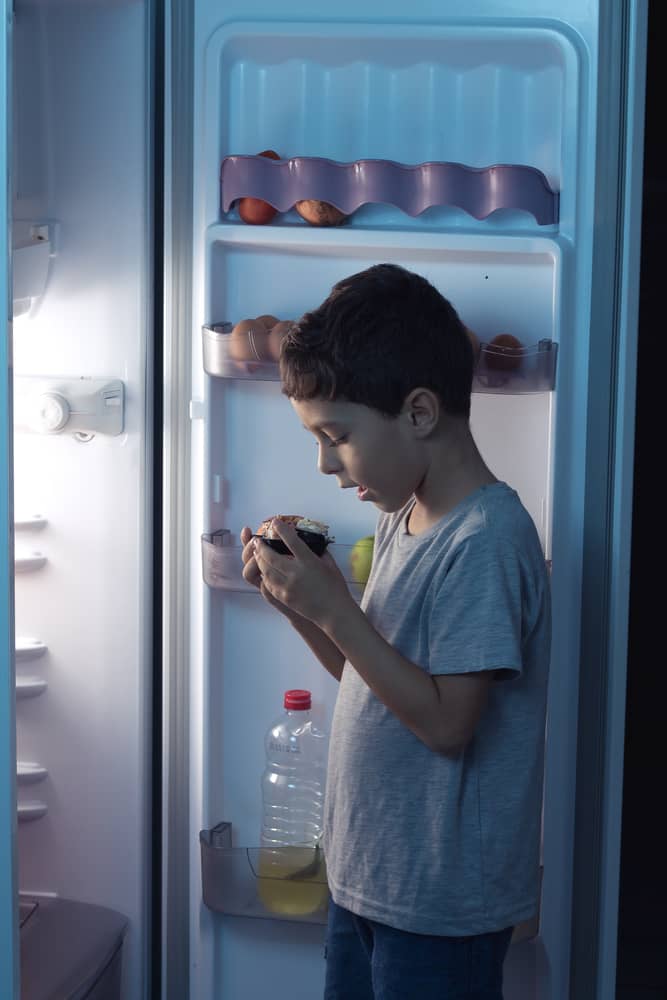Acid Reflux (GER & GERD) in Children
Return to Overview PageDefinition & Facts
In this section:
- What is GER?
- Does GER have another name?
- How common is GER in children?
- What is GERD?
- How common is GERD in children?
- Which children are more likely to have GERD?
- What are the complications of GERD in children?
What is GER?
Gastroesophageal reflux (GER) happens when stomach contents come back up into the esophagus. Many people, including children between 1 and 18 years old, have GER once in a while. GER often happens without causing symptoms. In some cases, GER may cause
- heartburn, also called acid indigestion
- regurgitation, or stomach contents coming up through the esophagus and into the throat or mouth
Does GER have another name?
Doctors also refer to GER as
- acid indigestion
- acid reflux
- acid regurgitation
- heartburn
- reflux
How common is GER in children?
Having GER once in a while is common.
What is GERD?
Gastroesophageal reflux disease (GERD) is a more severe and long-lasting condition in which GER causes repeated symptoms that are bothersome or leads to complications over time. The symptoms of GERD in older children and teens may be similar to the symptoms of GERD in adults. However, signs and symptoms of GERD in younger children may be different.
If you think your child has GERD, you should take him or her to see a doctor or pediatrician.
 If you think your child has GERD, he or she should see a doctor.
If you think your child has GERD, he or she should see a doctor.How common is GERD in children?
Few large studies have examined how common GERD is in children. Research suggests that about 10 percent of children may have GERD symptoms at least once a week.1 Research also suggests that GERD is more common among children age 10 and older than among younger children.1
Which children are more likely to have GERD?
Any child can have GERD. GERD is more common in children who are overweight, have obesity, or have a large waist size. Children with certain health conditions that affect the esophagus, nervous system, or lungs are also more likely to have GERD.
What are the complications of GERD in children?
Without treatment, GERD can sometimes cause serious complications over time. A pediatrician should monitor children with GERD to prevent or treat long-term problems, such as esophagitis, esophageal stricture, and Barrett’s esophagus, as well as complications outside the esophagus.
Esophagitis
Esophagitis is inflammation in the esophagus. Esophagitis may cause ulcers in the lining of the esophagus and bleeding. Chronic esophagitis increases the chance of developing esophageal stricture and Barrett’s esophagus.
Esophageal stricture
An esophageal stricture happens when the esophagus becomes too narrow. Esophageal strictures can lead to problems with swallowing.
Barrett’s esophagus
GERD can sometimes lead to Barrett’s esophagus, a condition in which tissue that is similar to the lining of the intestine replaces the tissue lining the esophagus. A small number of people with Barrett’s esophagus develop a type of cancer called esophageal adenocarcinoma.
Complications outside the esophagus
Some children with GERD also have complications in the mouth, throat, or lungs. These complications may include
- asthma
- chronic cough
- hoarseness
- laryngitis—inflammation of the voice box that can lead to a short-term loss of voice
- pneumonia that keeps coming back
- wearing away of tooth enamel
- wheezing—a high-pitched whistling sound that happens while breathing
References
Symptoms & Causes
What are the symptoms of GER and GERD in children?
Symptoms of gastroesophageal reflux (GER) and gastroesophageal reflux disease (GERD) vary by age among children. Symptoms of GER and GERD in older children and teens may be similar to symptoms in adults. Symptoms in young children may be more similar to those seen in infants.
GER and GERD commonly cause symptoms such as
- heartburn, a painful, burning feeling in the middle of the chest, behind the breastbone, rising from the lower tip of the breastbone toward the throat. Heartburn is more common in older children and teens than in young children.
- regurgitation, or stomach contents coming back up through the esophagus and into the throat or mouth, which may cause a child to taste food or stomach acid. Vomiting may occur along with regurgitation.
However, not all children with GER or GERD have heartburn or regurgitation. Other symptoms may include
- nausea
- pain in the chest or the upper part of the abdomen
- problems swallowing or pain while swallowing
- symptoms of complications in the mouth, throat, or lungs, such as cough, hoarseness, or wheezing
 Symptoms of GERD may include cough.
Symptoms of GERD may include cough.In children who are too young to describe their symptoms well, parents may notice signs of GER or GERD such as
- arching of the back and abnormal movements of the neck and chin
- irritability or crying more than usual
- loss of appetite or refusing to eat
- poor growth, weight loss, or gaining less weight than expected
Call a doctor right away if your child has signs or symptoms that could be related to a serious health problem other than GERD or a GERD complication. Examples include
- problems breathing
- problems swallowing or pain while swallowing
- refusing food repeatedly, causing weight loss or poor growth
- signs of bleeding in the digestive tract, such as
- vomit that contains blood or looks like coffee grounds
- rectal bleeding or stool that contains blood
- signs of dehydration, such as no tears when he or she cries
- vomiting
- in large amounts
- that is regularly forceful, also called projectile vomiting
- with bile in the vomit, which makes the vomit green or yellow in color
What causes GER and GERD in children?
The lower esophageal sphincter and diaphragm most often prevent GER, which is when stomach contents come back up into the esophagus. However, having GER once in a while is common.
GERD may develop if the lower esophageal sphincter becomes weak or relaxes when it shouldn’t, which may occur due to
- being overweight, having obesity, or having a large waist size
- inhaling secondhand smoke
- factors that are more common in teens, such as smoking or pregnancy
Children are more likely to have GERD if they have health conditions that affect the upper GI tract, including
- conditions that affect the nervous system, such as cerebral palsy
- conditions that affect the lungs, such as cystic fibrosis
- hiatal hernia, a condition in which the opening in the diaphragm lets the upper part of the stomach move up into the chest
- previous surgery to correct esophageal atresia, a type of birth defect
Some medicines can cause GERD or make GERD symptoms worse. Talk with your child’s doctor about any medicines he or she takes and whether those medicines could play a role in GERD.
Diagnosis
How do doctors diagnose GER and GERD in children?
In most cases, doctors diagnose gastroesophageal reflux (GER) and gastroesophageal reflux disease (GERD) by reviewing a child’s symptoms and medical history. If symptoms suggest GERD, doctors may recommend treatment with lifestyle changes or medicines, instead of doing tests.
Doctors may recommend medical tests if symptoms suggest that a child may have a health problem other than GERD or a complication of GERD. Doctors may also recommend tests if symptoms don’t improve with lifestyle changes or medicines.
Doctors may refer a child to a pediatric gastroenterologist to diagnose and treat GERD.
 In most cases, doctors diagnose GER and GERD by reviewing a child's symptoms and medical history.
In most cases, doctors diagnose GER and GERD by reviewing a child's symptoms and medical history.What tests do doctors use to diagnose GERD?
Doctors may order one or more of the following tests to help diagnose GERD and check for other health problems.
Upper gastrointestinal (GI) endoscopy
Upper GI endoscopy is a procedure in which a doctor uses an endoscope—a flexible tube with a camera—to see the lining of the upper GI tract, including the esophagus, stomach, and duodenum. During upper GI endoscopy, a doctor may obtain biopsies by passing an instrument through the endoscope to take small pieces of tissue from the lining of the esophagus. A pathologist will examine the tissue under a microscope. Doctors may order an upper GI endoscopy to check for problems other than GERD or complications of GERD.
Esophageal pH monitoring
Esophageal pH monitoring is the most accurate way to detect stomach acid in the esophagus. Two types of esophageal pH monitoring are
- catheter monitoring, in which a health care professional passes one end of a catheter—a thin, flexible tube—through the nose and into the esophagus to measure acid reflux. Health care professionals sometimes combine this test with an impedance monitoring test, which can detect nonacid reflux, during the same procedure.
- capsule monitoring, in which a health care professional uses an endoscope to place a small, wireless capsule on the lining of the esophagus to measure acid reflux.
The child wears a monitor that receives information from the catheter or capsule. During esophageal pH monitoring, a parent or caregiver tracks information about the child’s diet, sleep, and symptoms. The doctor uses this information to see how diet, sleep, and symptoms relate to reflux in the esophagus. Doctors may order this test to confirm the diagnosis of GERD or to find out if GERD treatments are working.
Upper GI series
An upper GI series is a procedure in which a doctor uses x-rays and a chalky liquid called barium to view the upper GI tract. Doctors may order this test to check for problems, such as anatomic problems in the upper GI tract, that may be causing or worsening symptoms.
Treatment
How do doctors treat GER and GERD in children?
Doctors may recommend lifestyle changes or medicines to treat gastroesophageal reflux (GER) or gastroesophageal reflux disease (GERD) in children. In some cases, doctors may also recommend surgery.
Lifestyle changes
Doctors may recommend lifestyle changes to reduce GER or GERD symptoms. Research suggests that certain lifestyle changes improve GERD symptoms in adults, but studies in children are limited.
Lifestyle changes your child’s doctor recommends may depend on your child’s age and symptoms. For example, doctors may recommend that children who have GERD
- sleep with their head elevated or sleep on their left side
- avoid eating just before they lie down or go to bed
- change their eating habits or diet
- avoid secondhand smoke or, if they smoke, quit smoking
 Doctors may recommend that children with GERD sleep on their left side.
Doctors may recommend that children with GERD sleep on their left side.Medicines
If lifestyle changes don’t relieve your child’s GERD symptoms, your child’s doctor may prescribe medicines. Some GERD medicines are available over the counter. Don’t use over-the-counter or prescription medicines to treat your child’s GERD unless told to do so by your child’s doctor.
Proton pump inhibitors (PPIs). PPIs lower the amount of acid the stomach makes. PPIs are better at treating GERD symptoms and healing the esophageal lining than other medicines, such as H2 blockers. Doctors typically prescribe PPIs to treat GERD in children for 4 to 8 weeks.2 In some cases, doctors may prescribe PPIs for long-term treatment.
PPIs are generally safe and effective. Side effects of PPIs may include diarrhea, headache, or upset stomach. PPIs may increase the chance of getting certain types of infections. Experts are still studying the effects of taking PPIs for a long time or in high doses. Talk with your child’s doctor about the risks and benefits of PPIs.
H2 blockers. H2 blockers lower the amount of acid the stomach makes. H2 blockers can help heal the esophagus, but not as well as PPIs can. H2 blockers may cause side effects, such as abdominal pain, diarrhea, and headache, and may increase the chance of getting certain types of infections.
Antacids. In some cases, doctors may recommend short-term use of antacids to relieve mild GER and GERD symptoms in older children or teens. These medicines can have side effects, such as diarrhea or constipation. Doctors don’t recommend long-term use of antacids, which may lead to serious health problems.
Other medicines. If PPIs, H2 blockers, and antacids don’t improve a child’s symptoms, the doctor may recommend other medicines.
Surgery
Doctors may recommend surgery to treat GERD in children if medicines and lifestyle changes don’t improve symptoms or if serious GERD complications occur. Children are more likely to develop complications from surgery than from medicines.
Fundoplication is the most common surgery for GERD. In most cases, it leads to long-term improvement of GERD symptoms. Surgeons most often perform fundoplication as laparoscopic surgery, making small cuts in the abdomen and inserting special tools to perform the operation. Laparoscopic fundoplication leaves several small scars. During the procedure, surgeons sew the top of the stomach around the end of the esophagus, which adds pressure to the lower esophageal sphincter and helps reduce reflux.
References
Eating, Diet, & Nutrition
How can changes in eating habits improve GER or GERD symptoms in children?
For children who have gastroesophageal reflux (GER) or gastroesophageal reflux disease (GERD) symptoms at night or while lying down, doctors may suggest they avoid eating for a few hours before they lie down or go to bed.
Being overweight or having obesity can increase the chance that a child will have GER or GERD. If you are concerned about your child's weight, talk with your child’s doctor. The doctor can check your child's overall health and growth and tell you if weight management may be helpful. Don't put your child on a weight-loss diet unless your child’s doctor tells you to.
 Doctors may suggest children with GERD avoid eating just before they go to bed.
Doctors may suggest children with GERD avoid eating just before they go to bed.What should a child with GERD avoid eating or drinking?
Some children who have GERD find that certain foods or drinks trigger symptoms or make symptoms worse. You or your child should talk with your child’s doctor about any foods or drinks that seem to increase GERD symptoms. The doctor may recommend reducing or avoiding certain foods or drinks to see if symptoms improve.
Clinical Trials
In this section:
- Why are clinical trials with children important?
- How do I decide if a clinical trial is right for my child?
- What aspects of GER and GERD are being studied in children?
- What clinical studies for GER and GERD are available for child participants?
The NIDDK conducts and supports clinical trials in many diseases and conditions, including digestive diseases. The trials look to find new ways to prevent, detect, or treat disease and improve quality of life.
Why are clinical trials with children important?
Children respond to medicines and treatments differently than adults. The way to get the best treatments for children is through research designed specifically for them.
We have already made great strides in improving children's health outcomes through clinical trials—and other types of clinical studies. Vaccines, treatments for children with cancer, and interventions for premature babies are just a few examples of how this targeted research can help. However, we still have many questions to answer and more children waiting to benefit.
The data gathered from trials and studies involving children help doctors and researchers
- find the best dose of medicines for children
- find treatments for conditions that only affect children
- treat conditions that behave differently in children than in adults
- understand the differences in children as they grow
How do I decide if a clinical trial is right for my child?
We understand you have many questions, want to weigh the pros and cons, and need to learn as much as possible. Deciding to enroll in a study can be life changing for you and for your child. Depending on the outcome of the study, your child may find relief from their condition, see no benefit, or help to improve the health of future generations.
Talk with your child and consider what would be expected. What could be the potential benefit or harm? Would you need to travel? Is my child well enough to participate? While parents or guardians must give their permission, or consent, for their children to join a study, the children must also agree to participate, if they are capable (verbal). In the end, no choice is right or wrong. Your decision is about what is best for your child.
The National Institutes of Health (NIH) is committed to ensuring you get all the information you need to feel comfortable and make informed decisions. The safety of children remains the utmost priority for all NIH research studies. For more resources to help decide if clinical trials are right for your child, visit Clinical Trials and You: Parents and Children.
What aspects of GER and GERD are being studied in children?
Researchers study many aspects of gastroesophageal reflux (GER) and gastroesophageal reflux disease (GERD), including new treatments for these conditions in children.
Watch a video of NIDDK Director Dr. Griffin P. Rodgers explaining the importance of participating in clinical trials.
What clinical studies for GER and GERD are available for child participants?
You can view a filtered list of clinical studies on GER & GERD in children that are federally funded, open, and recruiting at ClinicalTrials.gov. You can expand or narrow the list to include clinical studies from industry, universities, and individuals; however, the NIH does not review these studies and cannot ensure they are safe. If you find a trial you think may be right for your child, talk with your child’s doctor about how to enroll.
This content is provided as a service of the National Institute of Diabetes and Digestive and Kidney Diseases
(NIDDK), part of the National Institutes of Health. NIDDK translates and disseminates research findings to increase knowledge and understanding about health and disease among patients, health professionals, and the public. Content produced by NIDDK is carefully reviewed by NIDDK scientists and other experts.
The NIDDK would like to thank:
Carlo Di Lorenzo, M.D., Nationwide Children's Hospital

